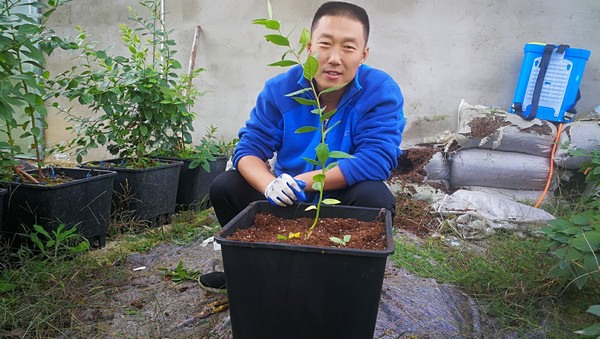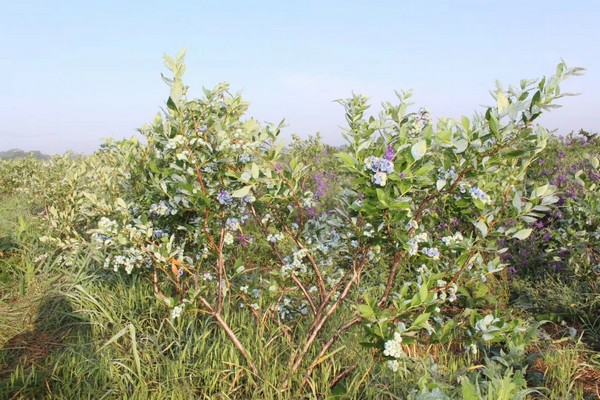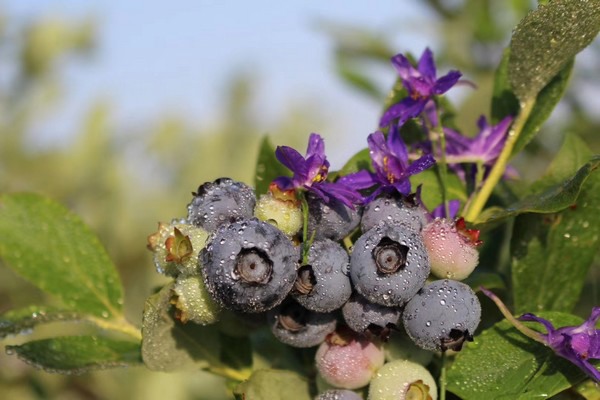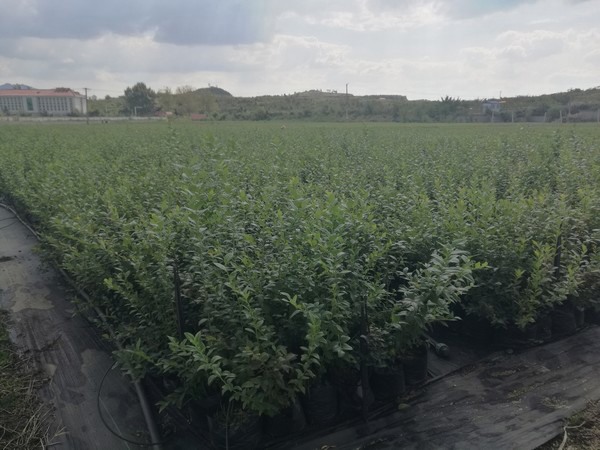The Chinese import volume of blueberries has rapidly grown in recent years. In addition, a growing number of international companies have invested in Chinese blueberry planters. This puts enormous pressure on the blueberry market. Manager Li of the Yantai City Jialin Family Farm recently talked about current conditions in the Chinese blueberry industry and discussed both the strengths and weaknesses of Chinese blueberry varieties.

Yunnan is the most suitable production area for blueberries in China. The province features a huge range of elevations, from Hekou at 76.4 meters above sea level to Jianshui and Xishuangbanna between 300-800, up to Kunming at 1,600 and Dali at 2,000, all the way to Lijiang at 2,400 meters above sea level.
The variety in elevation creates a number of micro-climates that are extremely suitable for the plantation of different blueberry varieties. Local farmers take advantage of these conditions to produce a wide variety of blueberries and rabbit eye blueberries. Two production areas in particular stand out for the exceptional quality of their blueberries: Honghe and Xishuangbanna. These production areas are located on the edge between a subtropical monsoon climate and a tropical rain forest climate. The diverse climate in Yunnan allows blueberries from the region to ripen at different times, so that the harvest is staggered, and blueberries do not all enter the market at the same time, but rather succeed each other in an extended supply season.
The supply season of fresh blueberries begins as early as October and continues until May in the subsequent year. The blueberries gradually enter the market in September and October and their volume grows in October, November, and December. The peak period of the blueberry season takes place in February and March, and the season then gradually comes to an end in April and May. In addition to these advantages, Yunnan also boasts excellent weather conditions and slightly acidic red soil that is excellent for the growth of blueberries. Furthermore, the high volume of UV-light and the large difference in temperatures during the day and at night all contribute to the excellent product quality of Yunnan blueberries.

"The hydroponic production of blueberries became quite popular in 2019. The investment in this type of plantation is high and the production season is short, but the production volume is huge and efficiency is high as well. This is an investor's dream. The investment cost in Yunnan is around 100,000 yuan [15,250 USD] per 0.07 hectare for hydroponic blueberry plantations, while the investment hydroponic plantations in the north is around 200,000-300,000 yuan [30,500-45,750 USD] per 0.07 hectare.
"There is a clear advantage for investment in Yunnan blueberry plantations. The first investment company to enter the blueberry industry in Yunnan was Driscoll's in 2014. After their successful performance, a larger number of investors saw the potential in Yunnan blueberry plantations and quickly followed." This is according to manager Li.

Although the Chinese import volume of blueberries is growing rapidly every year, the number of greenhouse blueberry companies in Yunnan is growing just as quick. Domestic companies have an enormous advantage in terms of surface area devoted to blueberry plantation and overall production volume. There is huge market potential in the blueberry industry.
The World Blueberry Summit in 2017 concluded a survey, the results of which suggest that China will be the largest producer of blueberries in 2026. The overall production volume is then expected to exceed 1 million tons. Other production areas have no way to compete with that number. However, there are some problems in the Chinese blueberry industry that affect future developments.
According to manager Li: "First, there are some blind spots in the domestic industry. For example, a large number of companies learned about the added-value of blueberries and quickly flocked to the market, but they do not invest in plantation technology. Blueberries require beneficial micro-organisms in the soil to improve the product quality of the berries. While a large number of companies spent huge amounts of money on marketing strategies, only a small number of companies invested in soil quality. That is why many companies have low production volumes and even lower product quality.
"Some foreign companies invested in Chinese blueberry plantations, and they generally spend their money on innovative plantation technology and the improvement of soil quality. They have established a new benchmark for the Chinese blueberry industry and some of the bolder Chinese companies quickly followed this investment strategy.
"Second, the number of domestic blueberry varieties is quite limited. There are a few varieties that dominate the market, and they all taste more or less the same. The consumer experience is therefore quite dull. Third, many consumers prefer imported fruit. This gradually lowers the price of Chinese blueberries. At the moment, Chinese blueberries are not able to attract the attention of domestic consumers."

Manager Li also spoke of the sales conditions in the Chinese blueberry market. "The import volume of foreign-brand blueberries is relatively large in the period between October and April. The production volume of domestic blueberries is initially still quite small and they are fresher, so their price is higher than imported blueberries. This is the case for blueberries from plantations in Yunnan and Sichuan, greenhouses in Dalian, and glasshouse plantations in Shandong and Lianyungang.
"The price of Grandezza brand import blueberries is around 14.8 yuan [2.26 USD] per 125 gram, or 118.4 yuan [18.06 USD] per kg. Domestic blueberries meanwhile cost around 160 yuan [24.40 USD] per kg, and prize-winning blueberries from Yunnan cost as much as 240 yuan [36.60 USD] per kg," said manager Li.
"The wholesale price of top-quality Peruvian blueberries in Yantai Wholesale Market is around 100 yuan [15.25 USD] per kg, and the wholesale prices for first-grade and second-grade Peruvian blueberries are 80 yuan [12.20 USD] per kg and 70 yuan [10.68 USD] per kg respectively. Their retail prices are 160 yuan [24.40 USD] per kg, 120 yuan [18.30 USD] per kg, and 100 yuan [15.25 USD] per kg respectively. In Shanghai the prices are slightly lower, around 10-20 yuan [1.53-3.05 USD] per kg lower than in Yantai.
"The overall surface area devoted to blueberry plantation in China exceeded 53,000 hectares in 2019, and the overall production volume reached around 210,000 ton. In 2020 the overall surface area reached 67,000 hectares and the production volume is estimated at 250,000 ton. Domestic market demand is around 1 million ton. The actual surface area that currently produces fruit is only around 27,000 hectares, which produces around 250,000 tons of blueberries. The market potential is obviously huge."
Manager Li also explained that improvements in plantation technology and the diversification of blueberry varieties are key for the development of the Chinese blueberry industry. "We hope to spread this awareness of soil quality to even more Chinese farmers and help them more effectively plant and produce blueberries on the acreage already in use. On the other hand, we also hope to cooperate with overseas companies to introduce more, top-quality blueberry varieties to the Chinese blueberry industry. In this way we can improve the Chinese blueberry industry together."
For more information:
Li Shaoming - Manager
Yantai City Jialin Family Farm Co., Ltd.
Tel.: +86 18663878528
E-mail: li18663878528@163.com
